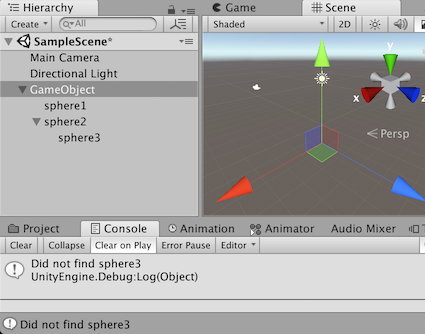Parameters
| n | 要查找的子项的名称。 |
Returns
Transform 如果找到子项,则返回该子变换;否则返回 null。
Description
按 n 查找子项,然后返回它。
如果未找到具有 n 的子项,则返回 null。
如果 n 包含“/”字符,它将像访问路径名称那样访问层级视图中的变换。
__注意:__.Find 不在变换层级视图中执行递归向下查找。
using UnityEngine; using System.Collections;
public class ExampleClass : MonoBehaviour { public GameObject player; public GameObject gun; public Transform ammo;
//Invoked when a button is clicked. public void Example() { //Finds and assigns the child of the player named "Gun". gun = player.transform.Find("Gun").gameObject;
//If the child was found. if (gun != null) { //Find the child named "ammo" of the gameobject "magazine" (magazine is a child of "gun"). ammo = gun.transform.Find("magazine/ammo"); } else Debug.Log("No child with the name 'Gun' attached to the player"); } }
As described Find does not descend the Transform heirarchy. Find will only search the given list of children looking for a named Transform. The following example shows the result of Find searching for GameObjects. The name of each GameObject is used in the Find. This is why two GameObjects in the same level of the hierarchy are found and reported.
A GameObject with three children. Find() does not find the third child.
// ExampleClass has a GameObject with three spheres attached. // Two of these are children of the GameObject. The third // transform, sphere3, is a child of sphere2. Find() does // not find this child.
using UnityEngine;
public class ExampleClass : MonoBehaviour { void Start() { Transform result;
for (int i = 1; i < 4; i++) { string sph;
sph = "sphere" + i.ToString(); result = gameObject.transform.Find(sph);
if (result) { Debug.Log("Found: " + sph); } else { Debug.Log("Did not find: " + sph); } } } }
Copyright © 2019 Unity Technologies. Publication 2019.1